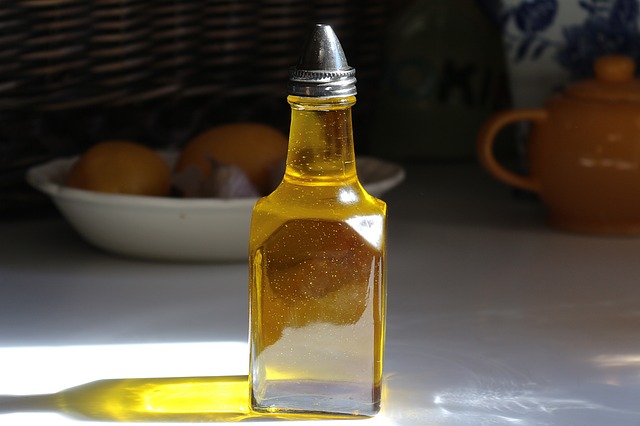
Refrigerating olive oil is something that most people will not do.
There are a number of reasons why this is so, some of which you can learn about in this article.
So, can you refrigerate olive oil?
Yes, you can refrigerate olive oil so long as you keep a couple of things in mind.
First of all, not all types of olive oil can be refrigerated. Refrigerating olive oil that has been infused with garlic and herbs will cause the flavors and scents of those ingredients to change and become off-putting.
Refrigerating olive oil that is made from olives that have been heated during the extraction process will also cause the flavor to be compromised.
Refrigerating olive oil is only for un-infused and cold-pressed olive oils.
How long can you keep olive oil in the refrigerator?
Olive oil can be refrigerated for up to three months.
Refrigeration will cause the oil to solidify, but it can be easily returned to liquid form by letting it stand at room temperature for about half an hour.
Refrigeration also helps extend the life of olive oil by helping to keep it from becoming rancid.
Refrigerated olive oil will not go bad, but it will lose flavor if keep in the refrigerator for too long.
When refrigerated, olive oil is brought back to room temperature, moisture in the air will cause condensation.
Refrigerating olive oil for any longer than three months can lead to this moisture affecting the quality of the oil by causing it to become rancid.
Refrigerated olive oil should be used within three months to ensure that it maintains its flavor and freshness.
What’s the best way to store olive oil?
While everyone gets their own preference, you’ll find that olive oil is best stored in a cool dark cupboard.
While many might think that refrigerating olive oil keeps it fresher longer, this is not the case at all.
Refrigerating your olive oil will actually cause it to become cloudy.
Refrigerators are not cold enough for the cloudiness to subside, so it is best to keep your olive oil at room temperature.
Refrigerating the oil will cause the flavor to change as well, making it less flavorful and smooth.
The cold temperatures in refrigerators will break the oil down by solidifying it, so when you try to use it after refrigerating it will have a harder time spreading.
Do you have to refrigerate olive oil after opening?
Refrigerating olive oil after opening is not necessary, but it might prolong the life of the product.
However, it is a good idea to buy smaller containers of olive oil, keeping them in the refrigerator after opening.
Refrigeration may also help slow down or prevent the natural breakdown of fatty acids in extra virgin olive oil, such as the conversion of oleic acid to linoleic acid.
Refrigeration may also help reduce oxidation, which can cause unsavory changes in the color and smell of olive oil.
Does olive oil go rancid at room temperature?
This is a question that has caused much debate.
Refrigeration may extend the shelf life of any given food, including olive oil.
It is a practice that was invented to keep the growth of bacteria, yeasts, and molds to a minimum.
However, the refrigeration process can affect the quality of foodstuffs.
It can also cause water in food products to freeze which can damage the consistency of the product.
Refrigeration of the olive oil may possibly increase its shelf life, but the flavor and quality of olive oil may also be diminished.
In the end, it is your choice.
How do you know if olive oil is bad?
There are many indicators of spoilage in olive oil.
Here are some of the most common ones:
1. Taste
If your oil has gone rancid or just isn’t right, it will be very apparent in the taste.
If your olive oil does not smell or taste like olives it may have gone rancid.
2. Appearance
One of the most common indicators is appearance, which can be related to taste as well.
If your olive oil appears cloudy or shows signs of sediment, it may have gone bad.
Sedimentation is normal for olive oil, but if you notice any cloudiness or other unusual discoloration, it may be time to throw your jar out.
3. Waxiness
Another sign of rancidity is the appearance of waxiness.
This can be seen by a cloudy or filmy appearance on the surface of the oil.
If your olive oil has been exposed to oxygen, it can develop a darker color.
If this has happened, you’ll notice the oil has turned from its natural golden-green to more of a brown or even red color.
4. Smell
If your olive oil smells of wet cardboard, it’s a sure sign that the product has gone bad.
If it smells of paint, your oil is rancid and should not be consumed.
5. Mold
Any appearance of mold on the olive oil’s surface is a clear sign that contamination has occurred and the product should not be used.
Refrigerating olive oil will keep it from going rancid.
Refrigeration also helps prevent any potential condensation from forming inside the jar.
Final Thoughts
In summary, olive oil can be refrigerated.
However, it is important to note though that refrigeration is not always necessary.
Olive oil can be stored at room temperature.
But if you want to keep your olive oil for a longer period of time, then refrigerating it is a good option.
In the end, it totally depends on your personal preference.
I hope this helps.
Learn more about refrigerating foods here.
